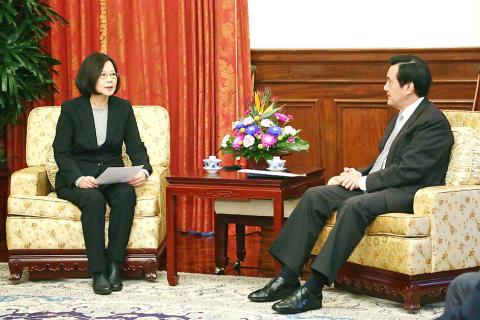President Ma Ying-jeou (馬英九) yesterday met with president-elect Tsai Ing-wen (蔡英文) to exchange opinions on an array of national issues in their first formal meeting since January’s presidential election, with both sides calling for cooperation and a smooth transfer of power.
Wearing a light-blue tie, Ma arrived at the Taipei Guest House — which is mostly used by the government to receive state guests or hold celebrations — at about 9:52am, eight minutes before his scheduled meeting with Tsai at 10am.
While waiting for the president-elect’s arrival, Ma inspected the meeting room with Presidential Office Secretary-General Tseng Yung-chuan (曾永權), Presidential Office Deputy Secretary-General Hsiao Hsu-tsen (蕭旭岑) and Presidential Office spokesman Charles Chen (陳以信).

Photo: EPA / Presidential Office
Tsai arrived at about 9:57am alongside Democratic Progressive Party (DPP) Secretary-General Joseph Wu (吳釗燮), DPP Deputy Secretary-General Jason Liu (劉建忻) and DPP Department of News and Information director Alex Huang (黃重諺). They were received by Tseng at the entrance.
In his opening remarks before the meeting, Ma congratulated Tsai and the DPP for their victories in the Jan. 16 presidential and legislative elections, which he said saw the election of the nation’s first female president and the third transfer of power in the nation.
Calling for “genuine cross-party rapprochement and cooperation,” Ma said different parties should take advantage of the current amicable atmosphere and the opportunity for communication presented during the handover period, seeking to hammer out consensus through dialogue.
“I am truly grateful to Taiwanese for giving me the opportunity to serve my nation over the past eight years and to build a just, free, prosperous and peaceful Taiwan,” Ma said.
“Now we are going to hand over the baton to [DPP] Chairperson Tsai,” he said, adding that he hopes the transfer of power would be smooth and seamless.
In response to the DPP’s attempts to push for an act governing transfers of power, the president said he supports any legislation that regulates the transfer of presidential power “within the scope of the Constitution.”
The Chinese Nationalist Party (KMT) caucus has said the DPP’s draft transfer of power act is unconstitutional, citing many clauses that it said could restrict the mandate of an outgoing president.
Expressing gratitude that the Presidential Office was able to arrange yesterday’s meeting swiftly after receiving her request, Tsai said she hopes the outgoing and incoming administrations could put aside their “offenses and defenses” during election campaigns and work to ensure a smooth handover of power.
“Our meeting today is significant for three reasons,” Tsai said.
The first one is democracy, which allows us to hand over power smoothly, Tsai said, adding that democracy is not only the most vital value in Taiwanese society, but also the most important national asset for future generations.
The second reason is responsibility, as the more than four-month-long caretaker period poses a challenge to the nation, she said.
The third reason is cooperation, Tsai said, adding that people aspired to see the possibility of political leaders working together and sitting down to jointly resolve major social problems.
Ma and Tsai then went behind closed doors for their meeting, which lasted about 75 minutes.
The meeting concluded with a minute-long handshake between the president and the president-elect.

The CIA has a message for Chinese government officials worried about their place in Chinese President Xi Jinping’s (習近平) government: Come work with us. The agency released two Mandarin-language videos on social media on Thursday inviting disgruntled officials to contact the CIA. The recruitment videos posted on YouTube and X racked up more than 5 million views combined in their first day. The outreach comes as CIA Director John Ratcliffe has vowed to boost the agency’s use of intelligence from human sources and its focus on China, which has recently targeted US officials with its own espionage operations. The videos are “aimed at

STEADFAST FRIEND: The bills encourage increased Taiwan-US engagement and address China’s distortion of UN Resolution 2758 to isolate Taiwan internationally The Presidential Office yesterday thanked the US House of Representatives for unanimously passing two Taiwan-related bills highlighting its solid support for Taiwan’s democracy and global participation, and for deepening bilateral relations. One of the bills, the Taiwan Assurance Implementation Act, requires the US Department of State to periodically review its guidelines for engagement with Taiwan, and report to the US Congress on the guidelines and plans to lift self-imposed limitations on US-Taiwan engagement. The other bill is the Taiwan International Solidarity Act, which clarifies that UN Resolution 2758 does not address the issue of the representation of Taiwan or its people in

US Indo-Pacific Commander Admiral Samuel Paparo on Friday expressed concern over the rate at which China is diversifying its military exercises, the Financial Times (FT) reported on Saturday. “The rates of change on the depth and breadth of their exercises is the one non-linear effect that I’ve seen in the last year that wakes me up at night or keeps me up at night,” Paparo was quoted by FT as saying while attending the annual Sedona Forum at the McCain Institute in Arizona. Paparo also expressed concern over the speed with which China was expanding its military. While the US

SHIFT: Taiwan’s better-than-expected first-quarter GDP and signs of weakness in the US have driven global capital back to emerging markets, the central bank head said The central bank yesterday blamed market speculation for the steep rise in the local currency, and urged exporters and financial institutions to stay calm and stop panic sell-offs to avoid hurting their own profitability. The nation’s top monetary policymaker said that it would step in, if necessary, to maintain order and stability in the foreign exchange market. The remarks came as the NT dollar yesterday closed up NT$0.919 to NT$30.145 against the US dollar in Taipei trading, after rising as high as NT$29.59 in intraday trading. The local currency has surged 5.85 percent against the greenback over the past two sessions, central